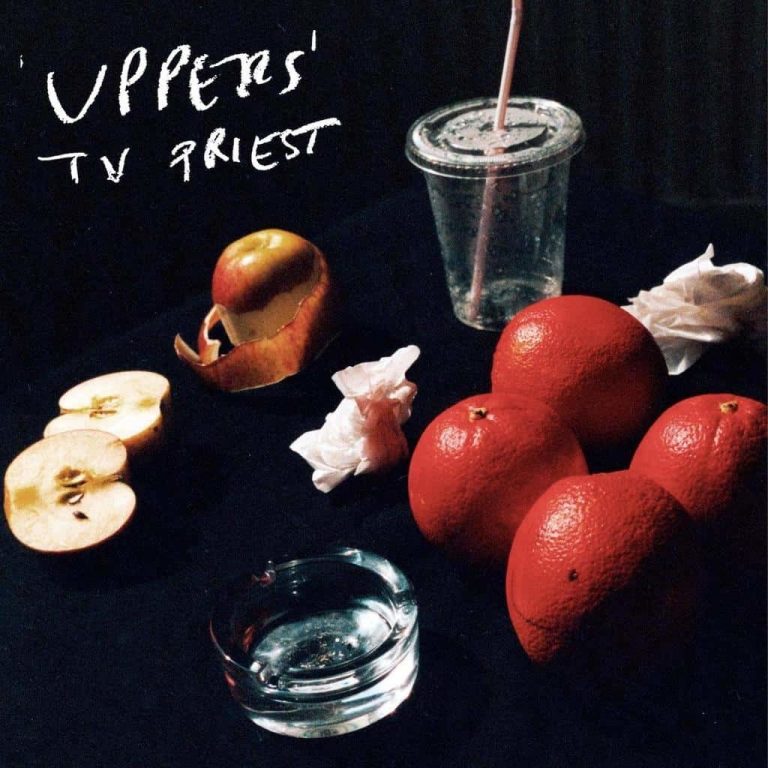This time last year, London quartet TV Priest had played precisely one gig and were yet to release a single; since then, they’ve gathered momentum at an impressive pace. Essentially speedrunning the route to their debut album in the midst of a pandemic, with two promising early singles released along the way – neither of which appear here – they hit the ground running, and said debut album, Uppers, crackles with the nervous energy of a group keen to make up for lost time.
All four members (Charlie Drinkwater, vocals; Alex Sprogis, guitar; Nic Bueth, bass/keyboards; and Ed Kellan, drums) were childhood friends, and later part of goth-pop outfit Torches, who fizzled out in the mid-2010s as life got in the way, as it tends to do. They crossed paths again some years later, and found that the creative spark was still there. This time around, their sound cleaves closer to the broad-brush post-punk (re-)revival movement spearheaded by the likes of IDLES, shame and Fontaines D.C. (incidentally, Drinkwater helped design the cover of the latter’s second album A Hero’s Death). But while they move in similar circles, TV Priest’s musical approach is quite different, and their debut is a clamorous, abrasive listen.
Courtesy of a needling riff from Sprogis that acts as an appropriately energetic introduction to the band, opener “The Big Curve” dives headfirst into noise rock; it’s the sonic equivalent of a battering ram, and offers the listener a neat summary of TV Priest’s constituent parts. Drinkwater’s impassioned sung-spoken delivery takes centre stage, which is an impressive feat given the sheer volume of what surrounds him, the band barrelling through the song’s five minutes with the sort of enthusiasm which many will find endearing.
The album’s certainly not short on pulse-quickening material; the pointed “Press Gang”, nailed down by Kellan’s drums, references Drinkwater’s grandfather’s days as a Fleet Street photographer and takes aim at the current state of the British media landscape (“Put the paper in your hands / Went for a walk through an insane land / You’re better off uninformed”). “Journal of a Plague Year” – which, if you’re wondering, was written pre-pandemic – dials down the musical intensity somewhat, lending increased focus to Drinkwater’s lyrical perspective, and its scathing chorus of “Hey buddy, normalise this! You better get used to it!” and references to “the new normal” seem particularly timely.
That track gives way to the ambient interlude of “History Week”, which bleeds into “Decoration” as Bueth’s bass is given its moment in the spotlight, providing one of the record’s most immediate hooks on an album that generally doesn’t concern itself with accessibility. On the whole, it’s an intense affair, driven by urgency and sheer anxiety; sometimes both simultaneously, as on “Powers of Ten”, whose slow build searches for a payoff that never quite arrives, instead tapering off into a noise-soaked coda that subverts expectations. If you’re looking for explosive moments, there are plenty elsewhere.
Indeed, the band save the best of those for last with closing track “Saintless”, which stretches to seven minutes, building from a barely-there melody to an all-consuming roar as Drinkwater reacts to entering fatherhood with all the shock and awe that calls for, dedicating the album’s closing moments to his wife and child: “This world is dark, with saintless few, so guard your love but give it too.” It’s an impressive way to cap off the album, and its epic scope may perhaps point to the band’s future prospects.
TV Priest’s focus is on societal ills as broader political commentary – typified by the likes of its penultimate track, the Brexit-battered rager “This Island” (“We’re drifting out in 350 million modern ways / Telling me we’re gonna be in those sunlit uplands / I don’t know, I read it somewhere, someplace, on the side of a bus”). Drinkwater has said that the album is meant as a “howl of frustration [that’s] a bit incoherent”, but the band put themselves on display nonetheless, incoherency and imperfection be damned. Uppers provides thrills aplenty from a band making their mark during strange times as our new normal sets in, intent on seizing their second chance.

